-
Email: info@blastours.com
Discovering Ghana
Welcome to the Land of Sunshine, also referred to as an ‘Island of Peace’. Ghana is one of the thriving democracies in Africa, inhabited by the world’s friendliest people.

Ghana, the gateway to Africa is situated right in the heart of West Africa . Its borders extend from the Gulf of Guinea covering a distance of about 672km from the south to the north, and about 540 km from the east to the west.
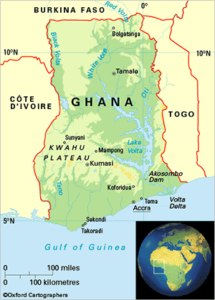 The country is bordered to the north by Burkina Faso , the east by Togo, the south by the Atlantic Ocean and the west by Cote d’Ivoire . A narrow grassy plain stretches inland from the coast, widening in the east, while the south and west are covered by dense rainforest. To the north are forested hills, beyond which is dry savannah and open woodland. In the far north is a plateau averaging 500m (1600ft) in height. In the east the Akuapim hills run inland from the coast along the Togo border. The Black and White Volta rivers enter Ghana from Burkina Faso , merging into the largest manmade lake in the world, Lake Volta. Ghana ‘s coastline is dotted with sandy palm-fringed beaches and lagoons.
The country is bordered to the north by Burkina Faso , the east by Togo, the south by the Atlantic Ocean and the west by Cote d’Ivoire . A narrow grassy plain stretches inland from the coast, widening in the east, while the south and west are covered by dense rainforest. To the north are forested hills, beyond which is dry savannah and open woodland. In the far north is a plateau averaging 500m (1600ft) in height. In the east the Akuapim hills run inland from the coast along the Togo border. The Black and White Volta rivers enter Ghana from Burkina Faso , merging into the largest manmade lake in the world, Lake Volta. Ghana ‘s coastline is dotted with sandy palm-fringed beaches and lagoons.
Ghana experiences two major seasons: the rainy season and the dry season. There are two main seasons of rainfall in the south starting from April to June and the minor rains from September to October. The northern region experiences a single rainy season from June to October. There is a dry season from November to April.
Climate
Ghana has a tropical climate, hottest months March, April, 23-31ºC and the coldest month, August 22-27 ºC. There are relatively long dry season from mid October to March. Driest month January has a maximum rainfall of 15mm. There are two rainy seasons, from March to July and from September to October, wettest month, June has 178mm average rainfall.
Vegetation
Ghana ‘s vegetation can be classified into three zones (a) coastal savannah, tropical rain forest in the central part and the guinea savannah in the north. FAUNA & FLORA: The warm sun, the regular rains and the fertile soils join together to give exuberant vegetation. As a result, dense tropical rain forests have over the years being conserved and developed into game reserves and theme parks.
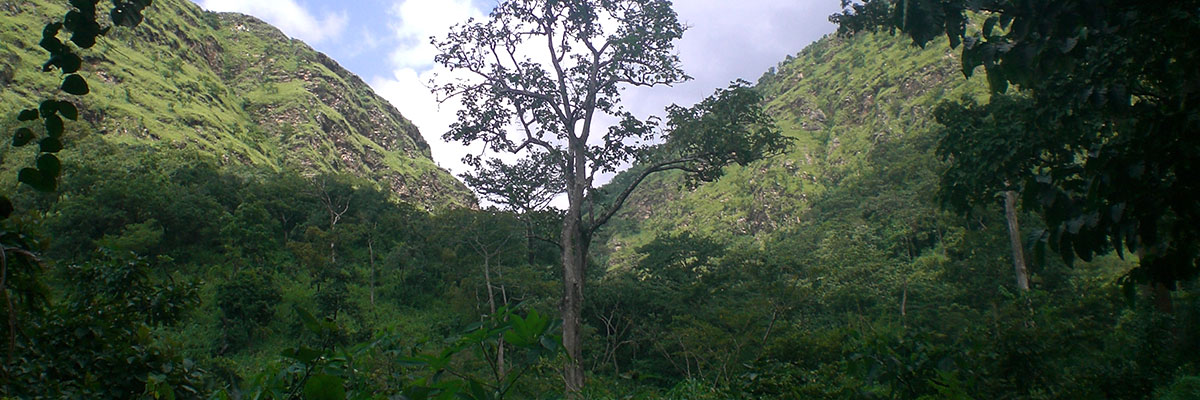
Tropical Rain Forest
Ghana used to share a virgin forest of about 85,000km², which has reduced to about 40,000km² due economic and human developmental activities. It is only in the extreme southwest with its wet climate that is left intact. Our deciduous and semi deciduous forests offer both economic and medicinal uses.
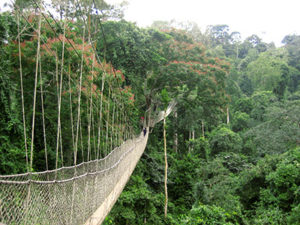
The Savannah
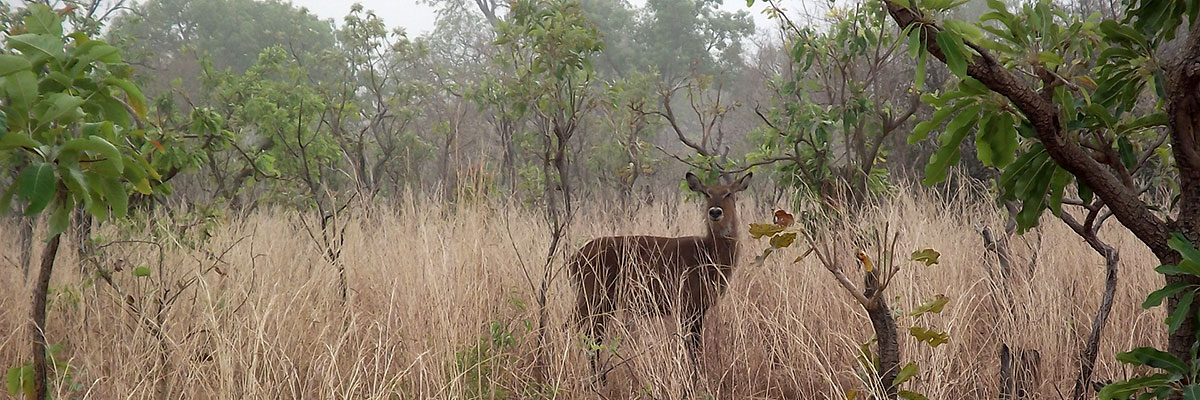
The savannah, which is the main vegetation in the northern and certain parts of the south, is endowed with birds that are suitable for bird watching and other mammals.
People
The Ghanaian hospitality is legendary. In this peaceful and loving country, all visitors are received warmly and sincerely regardless of race, religion, nationality or sex. Ghanaians are often referred to as ‘Africa’s Friendliest People‘.
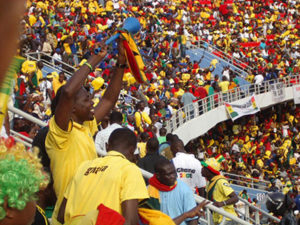
Population
Ghana has a population of about 19 million based on March 2000 population census. It is made up of 75 ethnic groups who speak 46 languages and dialects.
Educational System
Ghana ‘s policy of liberalization has been extended to private sector participation in education. The country’s literacy rate is about 50%. The educational system provides nine years of Free Compulsory Universal Basic Education, FCUBE, which is followed by a 3 year secondary / technical/ commercial and vocational education.

The tertiary level consists of teacher training colleges, Diploma and degree awarding institutions. There is also specialized management; technical and vocational institutions responsible for human resource development that ensure an immediate availability of skilled and trainable labor force as well as technical and managerial personnel.
In addition, there are special international schools, which follow the curricula of some foreign schools examination syllabi.
History and Government
Formerly known as the Gold Coast because of the abundance of gold, the name was changed to Ghana after attaining independence from British colonial rule on 6th March 1957.
The country is named after one of the ancient Sudanese Empires, which flourished between the 4th and 10th centuries. Subsequently, the area was divided among several kingdoms, of which the most important were the Fanti, who occupied the coastal region, and the Ashanti, whose territory was further inland. The Portuguese were the first Europeans to arrive in the late 15th century.
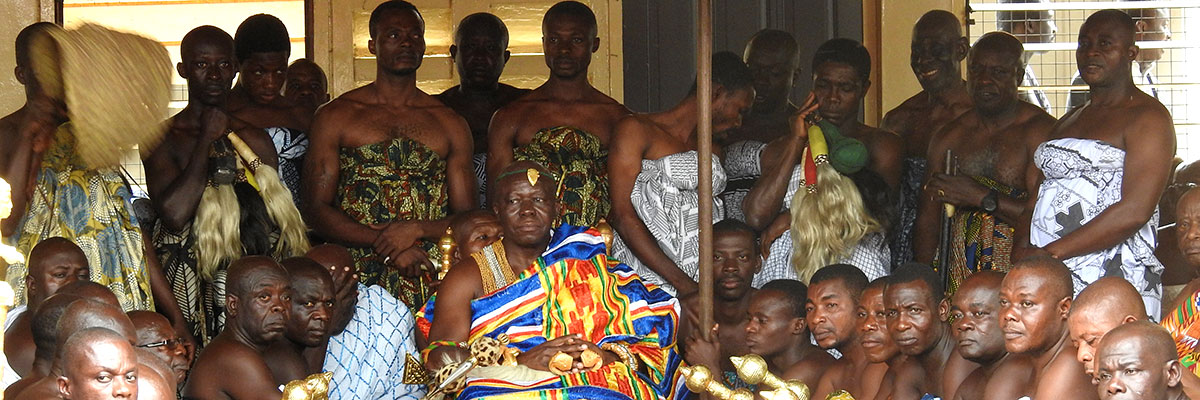
During the next 300 years, the Gold Coast became a major trading centre, mainly in gold and slaves. From the beginning of the 19th century, an increasingly assertive Ashanti kingdom drove out many of the European colonists. The important exception was the British who, allied with the rival Fanti kingdom, defeated the Ashanti in 1874 and took control of the whole of the Gold Coast. The Ashanti-controlled interior was subjugated over the next 15 years and converted into protectorates’, locally ruled under British supervision.
The colony’s lands were supplemented in 1917 by parts of neighbouring Togoland which was formerly under German control. Together, these formed what in 1957 became the independent state of Ghana – the first British territory in Africa to be decolonised. Three years after independence (1960) Ghana became a Republic with Dr Kwame Nkrumah, leader of the Convention People’s Party (CPP) as the first President.

Under Dr Nkrumah, Ghana made rapid and remarkable progress in education, industrial and infrastructure development and in the provision of social services. At the same time, the country played a leading role in international affairs – especially the United Nations and Commonwealth – in the struggle for the liberation of other African countries, most of which were still under colonial rule.
Ghana practices a multiparty parliamentary democracy based on a constitution. The Fourth Republican constitution, accepted by refrendum and came into force in 1992, provides for a unitary state governed by a president (and cabinet ministers) and a unicameral National Assembly.
The presidency has a four year term and an incumbent can serve a maximum of two years. The Parliament has 230 seats and is elected for a four year term. The Supreme Court headed by the Chief Justice at the apex of the Judiciary constitutes the third arm of Government in Ghana. The legal system is based on common English law, where the courts are bound to develop the notions of fairness to an individual. The constitution also makes provision for continued recognition of traditional Chiefs and customary laws.
Local Government: "A decentralized central government administration has been fostered at the local government level in Ghana, where there are 16 Regional Coordinating Councils (RCCs) and 260 Metropolitan, Municipal, and District Assemblies (MMDAs). These structures serve to involve grassroots participation in the formation and implementation of government policies and the general development of their areas of jurisdiction.
Head of State: President John Dramani Mahama , 2025.
Videos from our Channel


